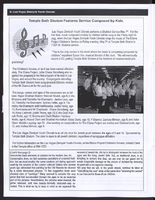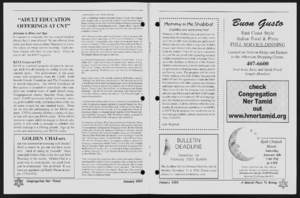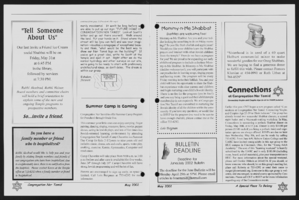Search the Special Collections and Archives Portal
Search Results

Steve Jones and Bart Jones interview, Novermber 7, 2016: transcript
Date
Archival Collection
Description
Brothers Steve and Bart Jones live and breathe Las Vegas history. Their grandparents, Burley and Arlie Jones, arrived in Las Vegas in the nineteen-teens; their father, Herb Jones; his sister, Florence Lee Jones Cahlan, and their uncle, Cliff Jones, helped form the legal, journalistic, and water policy framework that sustains Southern Nevada today. The Jones brothers build on that foundation through their custom home-building company, Merlin Construction. In this interview, they talk about living and growing up in Las Vegas, of attending John S. Park Elementary School, of hunting in the desert, of their family's commitment to cultural and racial diversity, and of accompanying their grandfather to his business at the Ranch Market in the Westside. They share their early work experiences lifeguarding and later, dealing, at local casinos as well as second-hand memories of the Kefauver trials through the tales told by their father and uncle. Steve describes mentor Audie Coker; he explains
Text

Transcript of interview with Byron Underhill by Joyce Moore, March 20, 2002
Date
Archival Collection
Description
Byron Underhill's father owned the first Coca-Cola bottling plant, the first beer distributorship, and the first bowling alley in Las Vegas. Byron moved here from Needles, Calif., with his family in 1927. Byron later took over the bottling plant, served in the Army as an aircraft mechanic and a glider pilot during World War II, was a private pilot who worked with Search and Rescue, played in various bands, and suggested to the Lions club that they found a burn unit at University Medical Center that is still the only one in the state
Text

Transcript of interview with Christie Young by Dennis McBride, October 18, 1998
Date
Archival Collection
Description
I've known Christie Young for many years and was grateful she agreed to be interviewed for the Las Vegas Gay Archives Oral History Project. Not only is she frank in what she says, but her background as a researcher in sexual issues and as a straight woman involved in the gay community give her a unique perspective. Ancillary to her donation of this interview transcript to the University of Nevada, Las Vegas, Christie has generously donated her personal journals which detail more than a decade of her life including the years she worked with Las Vegas's gay community . Christie shares the project's concern that documentation of the gay community is ephemeral and vanishes rapidly; her determination that her contribution to that community be preserved greatly enriches our knowledge and will benefit future scholars.
Text

Transcript of interview with Nora Luna by Maribel Estrada Calderón, November 7, 2018
Date
Archival Collection
Description
Nora Luna (1971 - ), the daughter of Mexican immigrants, recalls her growing up experience in the Las Vegas Valley. During her childhood, she and her siblings frequently persuaded their father to take them out to eat to the Circus Circus buffet. She enjoyed playing the carnival games at the Circus Circus. She attended Las Vegas High School. In 1994, she graduated from UNLV with a degree in criminal justice. Her education inspired her to work with the community’s youth. She tutored children at the Y.M.C.A. of Southern Nevada. Luna also worked for a program, Anahuac, which sought to deconstruct some of the myths that often prevent Latinos from attending college. In Reno, Nevada she worked with non-profit organizations to implement evidence-based practices for youth development. Luna has worked for Nathan Adelson Hospice as the Director of Diversity and Grant Funding since 2008. She seeks to find culturally competent care for Latinos and ensures that the hospice provides informational r
Text

Chelsie Campbell interview, January 9, 2019: transcript
Date
Archival Collection
Description
Chelsie Campbell is a Cuban-American attorney and lobbyist. Born on October 4, 1979, Chelsie is a native Nevadan and grew up in Las Vegas. Her mother, Norah Campbell, came to Las Vegas after the Cuban Revolution and works as an elementary school teacher. Her father, Alan Campbell, was a former teacher and hotel manager. An advocate for the Latino community, Chelsie has dedicated her life to advocacy. Her involvement began at UNLV where she found her voice through the Student Organization of Latinos (SOL). During her time with SOL, she advocated for the elimination of the social security requirement in UNLV’s admission process and lobbied for the retraction of Las Vegas Review Journal’s racist article on Latino students. Her activism in SOL also helped established additional SOL chapters across Las Vegas high schools and at the College of Southern Nevada. After earning her Bachelors in Broadcast Journalism and Spanish Literature from UNLV, Chelsie attended William S. Boyd Law School where she graduated in 2005. Chelsie also attended University of Nevada, Reno where she received her master’s in Management and a graduate certificate in renewable energy. Chelsie worked for Mach One Group as Editor-In-Chief of its two publications, Nevada Family Magazine and La Familia de Nevada. After law school, Chelsie began working at NV Energy as a spokesperson and worked her way up to government affairs. Chelsie is currently working as an independent lobbyist and choses her clients. Her clients include Clark County School District and NV Energy. Her work as a lobbyist includes helping agencies prepare for Nevada’s legislative session, conduct public policy research, and help with educational outreach. Through her activism, Chelsie has worked for former Senate Majority Leader, U.S. Senator Harry Reid. Chelsie is also part of the inaugural class of Emerge Nevada, a political leadership-training program for women in Nevada. Chelsie is on the Board of Trustees for the Leukemia and Lymphoma Society of Southern Nevada, the Chairwoman for the Nevada Advisory Board for CPLC Southwest, Board Member for the Advisory Commission on law-related Education for the State Bar of Nevada and serves on the Governmental Affairs Committee for the Latin Chamber of Commerce. She is the former President for the Boyd Law School Alumni Chapter and the Board of Directors for the Gray Plunkett Jydstrup Living Facility. Chelsie would like to dedicate her oral history to her parents: Without them, I wouldn’t be here.
Text





